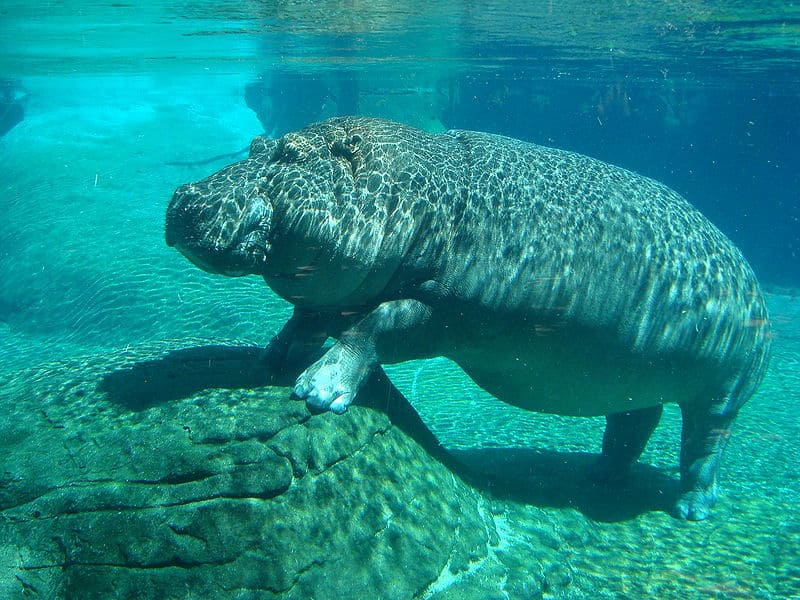Hippos are fascinating creatures. Are they a whale, a cow, or both? Despite their chunky appearance, hippos are actually quite athletic. They seem to have a reputation of being cute and bubbly (likely because of how rounded their features are), but anyone thinking that would be mistaken, especially if they were chased at surprising speed. Let’s take a look at these giants and learn: how fast can a hippo run?
How fast can a hippo run?
Hippos look fat and slow, but that is only half true – hippos are fat and fast! On average, hippos weigh 3,500 lbs, making them some of the largest animals in the world. In fact, the only species of land animal that is larger are elephants. How fast can hippos run?
On average, hippos can hit speeds of 30 mph. It’s hard to imagine how an animal as large as a hippo runs so fast, but it’s true! Since hippos live most of their lives in water, running isn’t something they often do. Still, they have the capability to run at great speeds when they need to.
Watching a hippo run is rather amusing (unless you are what they are chasing). Their gait is more of a gallop, giving credence to their Greek name translation of “river horse.
In the video above, you can see a hippo feel threatened by a large safari truck. Without much hesitation, it was able to increase its speed up to a gallop and catch up with the vehicle. Once they drive away, the hippo was then able to follow the car, showing just how easy it is for a hippo to put on speed when it needs it.
When would a hippo need to run?
We’ve discovered the answer to the question, “how fast can hippos run?”, but why would these corpulent pachyderms need to in the first place?
Hippos generally spend most of their time in the water but come on land for a number of reasons.
The most common reason hippos come on land is to feed at night. They spend about 5-6 hours of their day grazing, most of it during the night when the sun is down and less severe. They can range up to 2 miles in their search for grass, sometimes traveling significant distances from water (where they are most comfortable). While traveling across land, it’s common to see hippos trotting or cantering in a similar fashion to a horse.
Additionally, their habitat undergoes extensive environmental changes that occasionally result in the displacement of its fauna. Hippos aren’t excluded from this and can often be forced to migrate across great distances when the rivers, swamps, or lakes they live in dry up. In some instances, hippos have been recorded traveling up to 30 miles in order to find suitable watering holes or rivers.
If a hippo is running at full speed, it’s likely threatened in some way. There are a few telltale signs that a hippo is feeling threatened. Yawning is usually the first signal that is used to display their tusks and large size. If a predator or unwary individual doesn’t take the hint, a hippo could chase with the intent to scare or kill. These defensive measures are really the only times that a hippo would run at full speed.
How fast can a hippo swim?

Hippos come on land to graze and migrate.
©Jamin / Creative Commons – Original
Strangely enough, hippos are really bad swimmers. They are incredibly large with tiny, stubby legs. This funny combination results in their inability to tread water for any real length of time. They do have webbed feet, but that small adaptation isn’t enough to make up for their massive size and strange shape.
Still, how do they get around in the water? Well, hippos generally “bounce” along the river or lake bed when it gets deep. As shallow-water creatures, they mostly spend their time where they can stand. When they venture out into the deeper water, however, they resort to sinking, pushing off the bottom, and moving forward a bit. The little jumps allow them to transverse deeper areas, although it’s not very fast. Using this bouncing maneuver, they can reach speeds of 5 mph in the water.
Can a person outrun a hippo?

Humans run at an average speed of 12-15 mph, not nearly fast enough to outrun a hippo.
©nataliatamkovich/Shutterstock.com
Taking the top speed of a hippo (around 30 mph) into account, the prognosis doesn’t seem too bright for a human racing for dear life. Still, let’s take a closer look.
The average human can hit top speeds of 12-15 mph. For reference, that would be a 4:36 min mile, an impossible feat for almost any human to achieve. We are talking about sprints here, however. For an athlete, 15 mph is about as fast as things go. Most people in high school or college sports are able to reach these speeds over 100 meters, but only for 14 seconds or so.
Looking at the world’s fastest humans, however, things look a bit better. Usain Bolt has the record for the fastest speed ever reached by a human. He hit 27.5 mph for a brief second while he was sprinting for his 100-meter dash world record back in 2009. This speed was brief, however, and wasn’t sustained for the entirety of the run.
So, to recap, unless you are literally Usain Bolt racing a hippo that is already tired, it doesn’t seem likely that a human would ever be able to outsprint one in a race. Better climb a tree.
Can a person outswim a hippo?

Hippos swim at 5 mph, but average humans can only swim at 2 mph.
We’ve covered running, but what about swimming? It may be more likely since hippos are really poor swimmers. Let’s take a look at some numbers.
Average swimmers without training or prep can hit speeds of around 2 mph. Plainly put, this isn’t enough to escape an angry hippo. Let’s look at some others.
Professional swimmers on a national scale can reach top speeds of 5.3 mph in a pool environment. With a little bit of fear, they may be able to swim a touch faster. It looks like a professional swimmer may be able to slightly outpace a hippo if the race was only in open water.
Ultimately, you need to be a professional swimmer placed in ideal environments in order to beat a hippo in a water race. The lesson to take from this? Don’t race hippos.
Thank you for reading! Have some feedback for us? Contact the AZ Animals editorial team.








